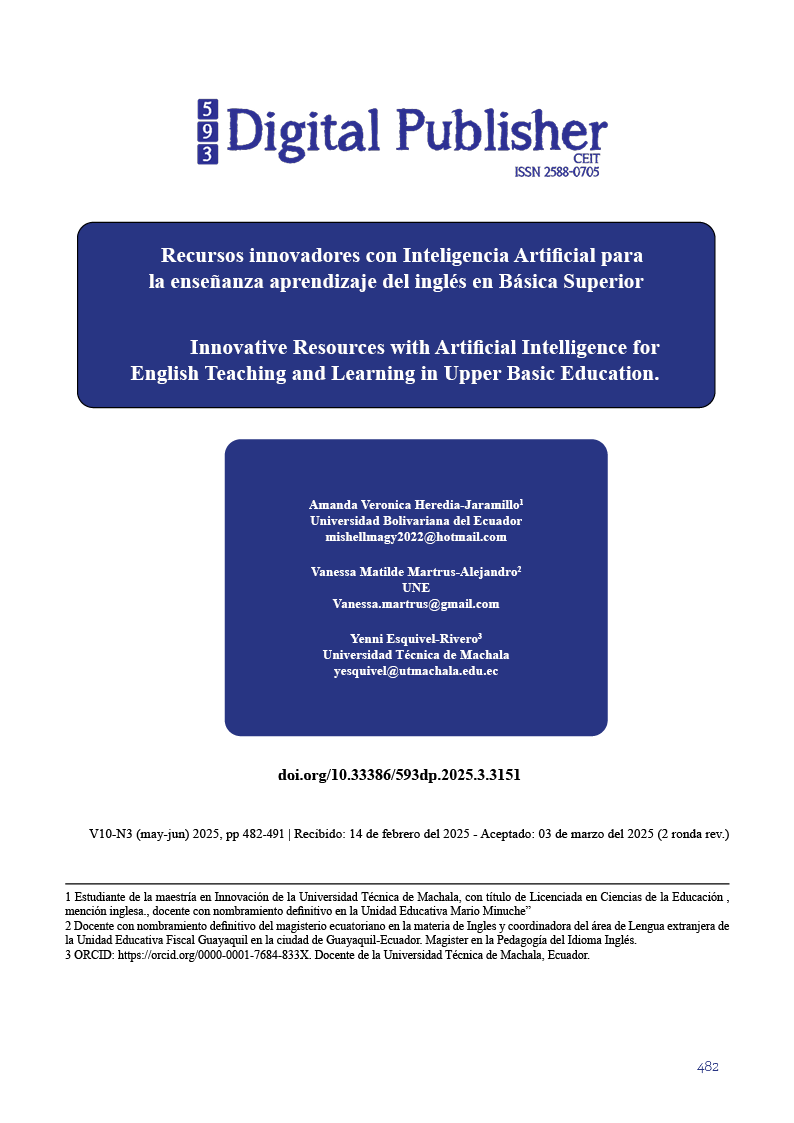Innovative Resources with Artificial Intelligence for English Teaching and Learning in Upper Basic Education.
Main Article Content
Abstract
The study examined the impact of Artificial Intelligence (AI) on English language teaching among high school students at the "Mario Minuche" Educational Unit in Machala City, Ecuador. Scientific question research was "How does the use of AI-based tools impact students' academic performance in English, particularly in grades, grammatical comprehension, and oral fluency?". Accordingly, the objective was to analyze the impact of AI-based technological tools on students' academic performance in English, specifically regarding their grades, grammatical comprehension, and oral fluency. It used a mixed-methods approach, incorporating three research methods: direct surveys, structured interviews, and document review. The results provided crucial information for teachers, students, and educational authorities, enabling informed decision-making regarding AI use in the classroom and the development of innovative pedagogical strategies. The study also demonstrated that AI applications influence students' grades, grammatical comprehension, and oral fluency while providing immediate feedback and fostering greater classroom interaction. Essentially, the study addressed the challenges of AI implementation, such as the need for teacher training, curriculum integration, and technological limitations.
Downloads
Article Details

This work is licensed under a Creative Commons Attribution-NonCommercial-ShareAlike 4.0 International License.
1. Derechos de autor
Las obras que se publican en 593 Digital Publisher CEIT están sujetas a los siguientes términos:
1.1. 593 Digital Publisher CEIT, conserva los derechos patrimoniales (copyright) de las obras publicadas, favorece y permite la reutilización de las mismas bajo la licencia Licencia Creative Commons 4.0 de Reconocimiento-NoComercial-CompartirIgual 4.0, por lo cual se pueden copiar, usar, difundir, transmitir y exponer públicamente, siempre que:
1.1.a. Se cite la autoría y fuente original de su publicación (revista, editorial, URL).
1.1.b. No se usen para fines comerciales u onerosos.
1.1.c. Se mencione la existencia y especificaciones de esta licencia de uso.
References
Aguirre Céliz, C. A., & Pérez Riesco, M. G. (2024). Tecnologías disruptivas para la enseñanza disruptiva: seis recursos web destacados para el aprendizaje del inglés. Revista Iberoamericana De Tecnología En Educación Y Educación En Tecnología, (39), e6. https://doi.org/10.24215/18509959.39.e6
Antonio Cruz, C. L., & Carrión Rodríguez, J. D. (2023). Uso de las Tecnologías de la Información y la Comunicación (TIC) en la enseñanza-aprendizaje del inglés, una revisión de literatura. Espacio I+D, Innovación más Desarrollo, 12(33). https://doi.org/10.31644/IMASD.33.2023.a02
Ayala-Pazmiño, M., & Alvarado-Lucas, K. (2023). Integración de la Inteligencia Artificial en la Educación del Idioma Inglés en Ecuador: Un Camino para Mejorar los Resultados del Aprendizaje. 593 Digital Publisher CEIT, 8(3-1), 679-687. https://doi.org/10.33386/593dp.2023.3-1.1862
Arrieta Bettin, L. E., & Aravena Domich, M. A. (2023). Importancia del idioma inglés como objeto de enseñanza y aprendizaje en el nivel de secundaria. Ciencia Latina Revista Científica Multidisciplinar, 7(2), 1056-1076. https://doi.org/10.37811/cl_rcm.v7i2.5383
Babativa Novoa Carlos Alberto (2017) Investigación cuantitativa: https://core.ac.uk/download/pdf/326424046.pdf
Caballero Alarcón, F. A., & Brítez Carli, R. (2024). Inteligencia Artificial en el mejoramiento de la enseñanza y aprendizaje, Ministerio de Educación y Ciencias. Acad. (Asunción), 11(2), 99-108. SciELO Paraguay. https://doi.org/10.30545/academo.2024.may-ago.1
Chinguel Laban, D. O., & Minaya Gutierrez, C. A. (2024). Inteligencia Artificial—Chatgpt: Un estudio bibliométrico y su aplicación en el caso de Gases de Efecto Invernadero. Manglar, 21(1), 149-157. SciELO Perú. https://doi.org/10.57188/manglar.2024.015
Delgado Rodríguez, S., García-Fandiño, R., & Carrascal-Domínguez, S. (2023). Tecnología inmersiva e inteligencia artificial para la mejora de la atención a la diversidad, la equidad e inclusión del alumnado: Estudio de caso con realidad aumentada. Dialogia, (47), e25204. https://doi.org/10.5585/47.2023.25204
Gonzáles Torres, L. M., Plúas Castro, A. E., Lamilla Pita, A. R., & Plúas Castro, M. M. (2024). Innovación educativa: el impacto de la inteligencia artificial en el aprendizaje en la educación en Ecuador.: Educational innovation: the impact of artificial intelligence on learning in Ecuadorian education. Revista Científica Multidisciplinar G-Nerando, 5(2), Pág. 2172 –. https://doi.org/10.60100/rcmg.v5i2.357
Guacán Tandayamo, R. C., Miguez Haro, R. E., Lozada Lozada, R. F., Jácome Cobos, D. I., & Cruz Gaibor, W. A. (2023). La Inteligencia Artificial Utilizada como un Recurso para el Aprendizaje. Ciencia Latina Revista Científica Multidisciplinar, 7(4), 8263-8277. https://doi.org/10.37811/cl_rcm.v7i4.7561
Holmes, W., Bialik, M., & Fadel, C. (2019). Artificial Intelligence in Education: Promises and implications for teaching and learning. Center for Curriculum Redesign. https://www.curriculumredesign.org/publications/ai-in-education
Jara, I., & Ochoa, J. M. (2020). Usos y efectos de la inteligencia artificial en educación. Inter-American Development Bank. https://doi.org/10.18235/0002380
Luna Meza, K. A. ., Chicaiza Chicaiza, R. M. ., Heredia Mendoza , E. M. ., & Schettini Velázquez, T. E. (2024). Innovación en el proceso de enseñanza-aprendizaje del idioma inglés en la Educación General Básica . Revista Científica Arbitrada Multidisciplinaria PENTACIENCIAS, 6(4), 66–76. https://doi.org/10.59169/pentaciencias.v6i4.1127
Moreno Agurto, V. A. (2020). La importancia de la enseñanza del idioma inglés en la etapa escolar. Alétheia, 8(1), 41–52. https://doi.org/10.33539/aletheia.2020.n8.2422
Rebolledo, R., & Gisbert, M. (2025). Aprendizaje adaptativo del inglés como lengua extranjera con herramientas de inteligencia artificial: una revisión sistemática de la literatura. Profesorado, Revista De Currículum Y Formación Del Profesorado, 29(1), 241–264. https://doi.org/10.30827/profesorado.v29i1.30828
Risueño Calahorrano, P. M., & Torres Andrango, S. J. (2024). Impacto desde el pensamiento crítico de la inteligencia artificial como herramienta para el aprendizaje del inglés. Revista Social Fronteriza, 4(2), e42255. https://doi.org/10.59814/resofro.2024.4(2)255
Rodríguez Fuentes, A., Sancho Noriega, C., Cabrera Torres, A. A., & Vílchez Delgado, R. M. (2024). Revisión sistemática sobre la Inteligencia Artificial para el aprendizaje del inglés L2. Porta Linguarum Revista Interuniversitaria De Didáctica De Las Lenguas Extranjeras, (XI), 91–107. https://doi.org/10.30827/portalin.viXI.30221
Sanabria-Navarro, J.-R., Silveira-Pérez, Y., Pérez-Bravo, D.-D., & de-Jesús-Cortina-Núñez, M. (2023). Incidences of artificial intelligence in contemporary education. Comunicar, 31(77). https://doi.org/10.3916/C77-2023-08
Sánchez Silva, Modesto (2005), La metodología en la investigación cualitativa:
http://hdl.handle.net/10469/7413
Sandoval, L. R. (2024). “Otra máquina le ganó al hombre”: Tratamiento de la inteligencia artificial en la prensa digital argentina. Dixit, 38. SciELO Uruguay. https://doi.org/10.22235/d.v38.3763
Sarmiento Coello, G., Coello Vázquez J., Montenegro Ayón, D. & Franco Bayas. M. A., (2021). Importancia del idioma inglés para el docente. https://doi.org/10.5281/zenodo.6525323
Solorzano Alcivar, E. A., Parraga Solorzano, R. J., Vargas Serrano, J. V., & Gomez Rivas, I. B. (2022). Digital didactic resources in English language teaching. Universidad Ciencia y Tecnología, 26(116), 84-92. https://doi.org/10.47460/uct.v26i116.647
Tello Coello, L. E. ., Morales Buitrón, P. A. ., Ocaña Gavilanez, M. M., & Lindao González, L. S. . (2024). Plataformas Basadas en Inteligencia Artificial para el Aprendizaje Autónomo del Inglés. Reincisol., 3(6), 5088–5100. https://doi.org/10.59282/reincisol.V3(6)5088-5100
Tramallino, C. P., & Zeni, A. M. (2024). Avances y discusiones sobre el uso de inteligencia artificial (IA) en educación. Educación, 33(64), 29-54. SciELO Perú. https://doi.org/10.18800/educacion.202401.m002
Trujillo Torres, J. M. (2024). Inteligencia Artificial y la promesa de una Educación Inclusiva. Revista Internacional de Investigación en Ciencias Sociales, 20(1), 1-4. SciELO Paraguay. https://doi.org/10.18004/riics.2024.junio.1




